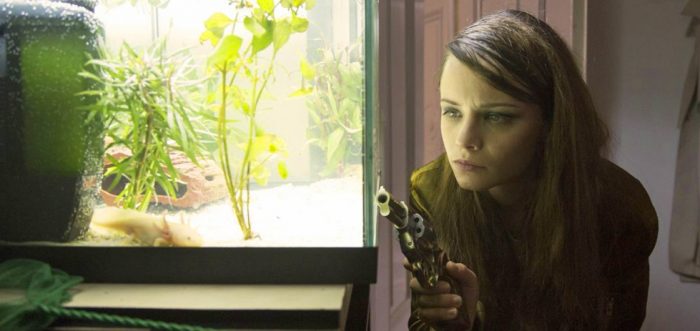
Sixteen-year-old Mifti comes face to face with a tank full of axolotl in a strange, after hours apartment. “It’s like Disney invented them,” an older man says of the translucent amphibians, who stay suspended in a state of permanent adolescence. “They never really grow up.” It’s the kind of broad, brazen analogy you’d expect from a precocious 25-year-old filmmaker, except that Disney would never dream up a chain-smoking, drug-taking middle-finger like Mifti — and writer-director Helene Hegemann, despite the bratty pose, has crafted a film that’s deceptively deeper than the as-billed wild teenage ride through Berlin nightlife. Once the smoke and shit and noise clears, Axolotl Overkill is a surprisingly affecting debut, less concerned with teenage debauchery than the world of disarray in which its characters move. It’s also one that’s strongly attuned to the bonds between women — where they can be lovers, sisters, or mothers; sometimes, all at once.
Hegemann’s novel Axolotl Roadkill was published when she was just 17, and drew its share of controversy — accused of plagiarism in the German press, Hegemann defended her prose as “mixing” — a fact she seems to meet head on here. Overkill — its title perversion an amusing kiss-off to detractors — opens in media res on fortyish Alice (Arly Jover), ranting to an off-screen subject about how she’s fed up with people feigning experience. It feels like a canny remark, especially when the unseen party turns out to be Mifti, Hegemann’s very own on-screen avatar. And as the teenage protagonist, 27-year-old Jasna Fritzi Bauer fakes it so real: world weary yet naive, she spins on a dime from adult indifference to childlike fervour.
Mifti’s mother is brain dead, and not in a sarcastic teen movie sense; she’s literally in a coma. Unmoored, Mitzi’s on and off meds, bouncing between life with her exasperated step-sister (Laura Tonke), nocturnal benders with drug-fucked actress pal Ophelia (Mavie Hörbiger), and later Alice, the older, alluringly street-wise hustler. Both women are lovers and mother figures to an extent, which makes sense once we meet Mifti’s surviving paternal figure: her middle-aged dad (Hanns Zischler), an overgrown adolescent who lives in a designer-chic Eastern bloc ruin with his girlfriend of the month and drunkenly rambles about terrorism being an “upper class” pursuit that he likens to video art. Little wonder she’s on the run for something, anything. “Where to?” asks a cab driver at one point. “It doesn’t matter,” Mifti replies, eyes rolled back into teenage infinity.
The film’s organic flashbacks and forwards establish a queasy slipstream of Mifti’s life; we rarely see her in school or around those her age, just sauntering through seedy shadows, nightclubs, and hotel rooms. Unlike the nostalgic lens through which older directors tend to approach their teen subjects, Hegemann feels tightly aligned with Mifti’s perspective in the present — in one moment, her camera erratically pushes in and out on Mifti in café for no apparent reason, as though a friend had captured the footage while fidgeting on a cellphone. DP Manuel Dacosse’s (Evolution) gentle hues find unexpected warmth in the treacherous night, while Christian Petzold’s frequent editor Bettina Böhler (Phoenix, Barbara) builds an unfussed, naturalistic montage through which Mifti’s gaze moves back and forth; time never feels specific, reality and daydreams are interchangeable. That sense of dislocation is served by the occasional surreal interludes: a Maddie Ziegler-esque dance, a wandering penguin, a woodland unicorn that evokes that wackiest of all coming-of-agers, Louis Malle’s Black Moon. The eponymous salamanders even get their own scene (and credits: variously billed as “Kim, Kelly, Kenny, and Jens”, clearly the enigmatic Kristen Stewarts of their amphibian generation.)

Though Axolotl Overkill serves up the requisite culture of teen wastoid abandon, Hegemann is just as attentive to its precedents. A scene at a Nazi death camp memorial in which a bunch of bored teenagers flick cigarette butts is your all-purpose ‘youth of today’ metaphor, but Hegemann knows it’s symptomatic of the world that these kids have inherited, as always, from previous generations. If you think these teens are fucked up, well, here’s pops slurring facetiously about terrorism, or a school principal tossing scalding hot coffee over her student for laughs. Turns out Mifti, all of 16, might just be more mature than everyone around her. The movie’s remit to be deeper riff on adolescent ephemera is echoed in the dynamic soundtrack choices — the way, for example, a disorienting club scene hitched to pulsing German techno recedes into the melancholic vibe of Julie Driscol’s vocal on “When I Was Young,” as though Hegemann were gazing back at herself from some contemplative future. That preternatural reflection is there in Alice and Mifti’s connection, too; in many ways Alice’s presence, never quite real, is like a visiting ghost from one of Mifti’s possible adult lives.
It’s also a world governed by the desire and movement of women. “I just want to be nurtured,” Mifti tells her father before both erupt laughing, as if recognising the impossibility of this man — any of the film’s men — possessing the potential for love, paternal or otherwise. Mifti’s desultory jaunts coalesce into something of a search for a family; the way that we, as teenagers, hunt for people to map out alternative trajectories. “Blood relatives,” she scowls during a would-be family intervention. “Why can’t we kill off this model!” Mifti’s relationships with Ophelia and Alice, while sexual and fluid, are also maternal. During one hotel scene, Alice opens her shirt to Mifti in overt sexual offering, but she may as well be drawing her teenage lover to suckle her breast. Mifti’s yearning for a nurturing mother figure recalls Bauer’s performance in Petzold’s Barbara, and that memorable image of her curled up on a beach against Nina Hoss.
In navigating these themes, Hegemann’s movie is weirdly hopeful and alive with the electricity of youth. It doesn’t just revel in the abandon, it hints at the potential for renewal in a society populated by adults more clueless than their kids. When Mifti finally steals a lover’s Benz and makes off into the open road, screaming “Fuck you, fuck you, fuck you” to the car and life in general, she ends up alone on a deserted forest highway. Rather than have her collapse into lost youth cliché Hegemann sends Mifti up a hill to scramble for cellphone reception — in a world without a compass, she may as well take the future into her own hands. And with adult prospects like the one she’s faced with, why not — like the titular amphibian — stay young forever?
